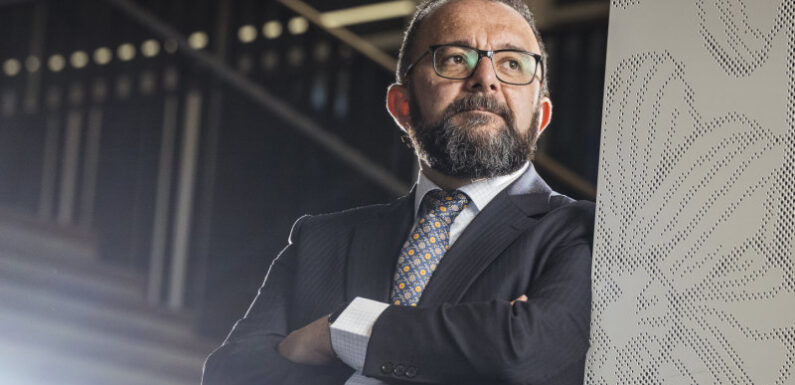
Save articles for later
Add articles to your saved list and come back to them any time.
Payroll tax would be removed from all schools in Victoria – including public schools – under a Coalition state election pledge, after an independent watchdog found abolishing the levy for government schools would have no impact on the state budget.
The policy comes as private schools warn parents could face additional costs outside annual fees as campuses scramble to offload income in an effort to stay under the threshold for the controversial tax.
Marcellin College principal Marco DiCesare.Credit: Chris Hopkins
The state government announced at the 2023 budget that some high-fee private schools would lose payroll tax exemptions, saying the move was responsible and fair given all public schools were subject to the levy.
But the state opposition has long argued that position was nonsensical because public schools were paying tax to the same government that funds them.
In analysis requested by the opposition, the Parliamentary Budget Office said on Thursday that while public schools would pay a total of $574.3 million in payroll tax in 2026-27, it had “no net impact on the state budget”.
“The Department of Education pays payroll tax to the State Revenue Office, which returns it to consolidated revenue,” the report said. “When the Department of Treasury and Finance consolidates the state budget, it eliminates this payment from the budget as a transaction between state government entities.”
Opposition education spokesperson Jess Wilson said the Coalition would remove the burden from every school if elected in 2026.
“The Labor government has been duplicitous in its desperate attempt to defend its unfair and punitive schools tax by claiming public schools are required to pay payroll tax, when in reality this has no impact on the state budget,” Wilson said.
Non-government schools have traditionally been exempt from payroll tax.
The government named 60 schools that would pay the tax in July but amended the policy in August, after The Age reported other schools that breached the $15,000 income per student threshold would not be included before the policy was reviewed in 2029.
Separate Parliamentary Budget Office analysis requested by the opposition on Wednesday predicted an additional 18 schools would breach the threshold by the time the tax was reviewed in 2029.
The tax is estimated to bring in $320 million over the course of the policy. The budget office estimated the extra schools would deliver another $26.9 million to the state government over five years.
Parents whose children attend schools already on the list are being slugged with additional charges, as schools attribute fee rises of up to 9.9 per cent directly to the payroll tax, warning that the rises will cover only six months of the tax in 2024.
Schools and tax experts are demanding the threshold be indexed to allow for inflation.
Principal of Marcellin College in Melbourne’s east Marco DiCesare said that without indexation, his school would have no choice but to “push off” costs currently counted as income to try and stay under the threshold.
DiCesare said this could include telling students to bring their own devices or having parents pay directly to third parties for expenses including music lessons and school excursions.
“It will just make it more difficult for parents,” he said.
The government has so far resisted calls to index the threshold to allow for inflation and bracket creep.
DiCesare, whose school will charge $14,070 for year 12 fees next year, said he wanted the tax abolished, but the lack of indexation was also disappointing.
“I think if they’ve set a limit you index it according to the education CPI, you don’t just leave it at that,” he said. “We’ve been really desperately trying to look at ways of how we can minimise … increases and the reality is just your teacher wages, your electricity bills, your gas bills, things are going up so quickly. A lot more schools are going to be jumping into that [payroll tax] category.”
The Tax and Transfer Policy Institute’s Bob Breunig said Australia tended not to index taxes, but it was a “horrible” way to set up policy that encouraged people to manipulate their incomes to avoid paying.
“Government tax should not be in the business of incentivising that kind of behaviour,” he said. “Government policy should be about raising revenue in a fair, equitable, transparent way. And so this kind of violates those principles.”
Andrew Wade, acting co-director of Victoria University’s Centre for International Research on Education Systems, said the payroll tax should be implemented on a sliding scale depending upon how much schools made from student fees.
“If it’s just above the $15,000 threshold it should be at a lower rate and if the fees are at a higher level still they pay a higher level of payroll tax,” he said.
Independent Schools Victoria chief executive Michelle Green and Catholic Education Commission of Victoria executive director Jim Miles said the lack of indexation added to the tax’s unfairness.
“It makes no allowance for the rising costs every school faces. To cover those costs, schools have no option but to raise fees. In doing so, they are snared by a tax,” Green said.
A Victorian government spokesperson said 667 non-government schools would still not be liable for payroll tax and exemptions would be made to schools that genuinely needed support.
“Every government school in Victoria pays payroll tax – it’s only fair that the highest-fee private schools now also contribute,” the spokesperson said.
With Nicole Precel
Start the day with a summary of the day’s most important and interesting stories, analysis and insights. Sign up for our Morning Edition newsletter.
Most Viewed in National
From our partners
Source: Read Full Article
